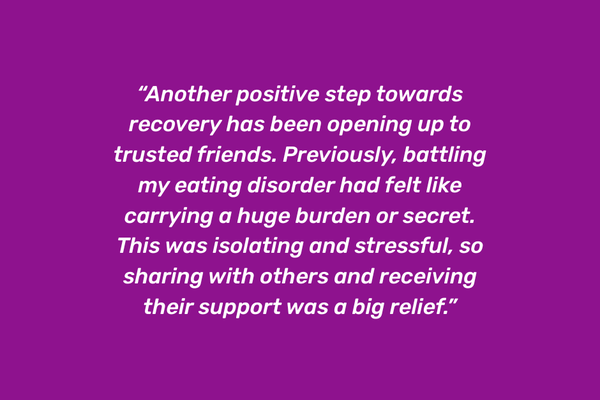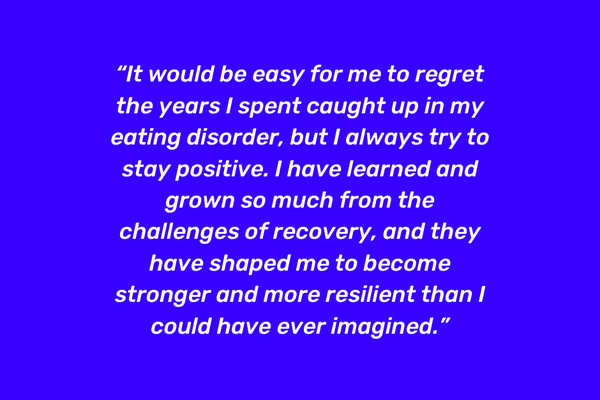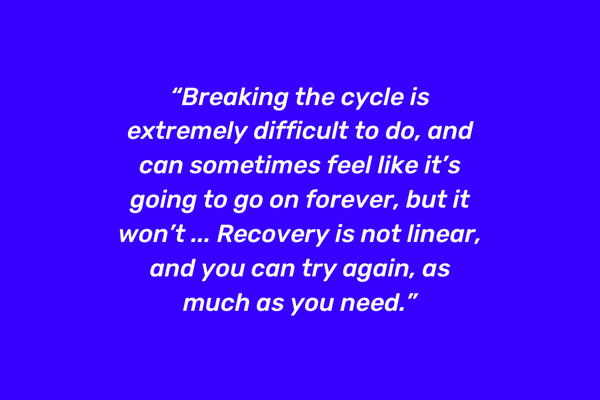For many Muslims, Ramadan is a time of reflection and spiritual development. But for those struggling with an eating disorder, it can present extra challenges. Our supporter Ayisha explores her experiences of navigating Ramadan while in recovery from her eating disorder...
Ramadan is here. The blessed, blissful month of spiritual healing, worship, and peace. Muslims fast for a whole month from sunrise to sunset to practice self-control and to be able to empathise with the poor and needy. All in all, Ramadan is a good, religious blessing to make use of for self-improvement. (I am not saying everyone should start fasting and expect to be magically cured, however).
I had a dietitian, a therapist, an eating disorder consultant, and my care co-ordinator tell me not to fast during Ramadan. At that point I had fasted since I was 9 years old and was very eager to continue. Their words made sense to me, but I always need a lot of logic and reasoning to understand and do anything. I wanted to have better insight regarding what the correct guidance for Ramadan was, for a Muslim with an eating disorder.
I reached out to a knowledgeable Imam in the first instance. Perhaps not fully understanding what an eating disorder was, he informed me that fasting was blessed and capable of healing. While he did not in any way pressurise me to fast or tell me that it would cure me, my very overwhelmed and conflicted mind saw his advice as: I should fast if I am a good Muslim. Fasting is important. I must fast.
I still needed further guidance, so I turned to the local Facebook group and was in touch with a female, Muslim accredited therapist. I asked her the exact same questions I had asked the Imam, and she decided that having an eating disorder meant that I struggled to stay hungry or without food for long periods of time. It was funny for me to listen to her tell me about how I should fast, and it would provide me with healing and relief.
It was obvious that this person had no idea what an eating disorder is and had decided that I was some sort of weak person looking for an easy way out. Her comments were in no way logical, so I completely ignored her and carried on in my struggle to seek assurances.
Islam goes against harming yourself, and unfortunately for me to be fasting was causing more harm than good.
It was during my MSc. At Goldsmith’s University in London that I finally was able to seek well-informed guidance from a Muslim guidance counsellor. He was helpful in making me realise what was happening, assuring me that I would be doing the right things and that I was right in trying to seek understanding and logic regarding what was happening for me. Through this individual I made the painful realisations that:
1) I was not fasting to practice self-control. I was fasting because I adored and craved the thrill that came from long periods of starvation
2) Islam goes against harming yourself, and unfortunately for me to be fasting was causing more harm (psychologically) as well as physically, than good.
Every year, during the most blessed and spiritually fruitful time of the year I find myself shackled to the heaviest weight I could have ever thought it would be possible to carry. It is a month where the devout and faithful have their thirsts and hunger quenched by an unimaginably potent and honey-sweet peacefulness, one that is thought to extend beyond them and sweeten the atmosphere around them. For me, however, I find my parched mouth pursed against a bitter, acrid blaze of guilt that I am hoping to one day completely swallow, choke down and move onwards without my disorder-drenched brain blipping, diving and swooning helplessly straight into the arms of the sinister eating disorder that thrills at the prospect of being able to disguise disordered behaviour as Religiousness.
I was not fasting to practice self-control. I was fasting because I adored and craved the thrill that came from long periods of starvation
I am unashamedly admitting that I used to quite happily fast for all the wrong reasons.
When I was younger, it became the perfect time for me; I would fast. I would drift around emptily with all the dignity of a balloon that is completely blown out of control, and will most likely end up polluting a stream, or getting stuck in some poor animal.
From the age of four, Ramadan was the time of the year when the happiness inside me burst, overflowed and completely overwhelmed everything around me with a faintly dizzying and very bright glow that hurt my eyes and made my very dry lips burn.
At the age of 25 the jarring truth rudely stabbed my brain and steered me towards a sort of ‘awakening’. I wasn’t fasting for religion. I wasn’t being a ‘good Muslim’. I was fasting because those were the days when I could cut down on my intake more than anyone could even notice, or think about. There was a blinding excitement that would light up my life, blurring out anything else BUT my ability to reduce my intake without any questions, or glaringly obvious intrusions. I loved the Hungry High, or completely euphoric and blissful state of pure joy I would become immersed in as this month calmly strode on, and my mind was bloated wretchedly by a completely intoxicating urge to not eat at all, or eat as little as I could, or avoid eating.
Now, at almost 29 I spend so much of the time before Ramadan, and during Ramadan feeling such excruciating agony and despair that I aimlessly drift around in a frazzled state for most of it.
I chose to stop fasting.
I decided to refrain from Ramadan because unfortunately I lack the ability and strength to disengage from the compulsive and completely addiction-like clutches of my eating disorder. It has been a few years now, and while I don’t fast I find myself forever battling to find my balance on the finest, sharpest pinnacle of guilt and internalised frustration.
Of course I WANT to fast. I realise that it is expected of any able bodied and minded adult. I know that many would sneer at me if they even knew that I was unable to fast.
But is it healthy to be irrevocably obsessed with the mere thought and idea of being food-less as long as possible? Is it normal to trip up on my own bumbling thoughts about restriction and avoidance of food, of being able to completely avoid consumption and just fake being A Good Muslim who doesn’t harm herself, who is devout and perfectly normal?
My act of devout faith and spirituality in Ramadan is my battle against my nafs, to nourish my body, and therefore my soul.
Unfortunately, I can’t fast because my eating disorder has a very painful and thorny noose twisted suffocatingly around my brain, and there is nothing I can do about this right now.
Maybe that makes me a Bad Muslim. Surely it doesn’t though; I’m not fasting to avoid harming myself, a very BIG principle of my religion that extends beyond what most people could contend with.
My act of devout faith and spirituality in Ramadan is my battle against my nafs, to nourish my body, and therefore my soul. It admittedly looks different to everyone else around me, but it is my war, my life and my faith turned into my biggest secret. However, I want to share my struggle in its entirety in the hopes that I can maybe ignite flames of curiosity, compassion or even hope in the minds and hearts of others like me, or caring for those like me. I do appreciate I do not have to explain myself to anyone. The only reason I have decided to attempt to voice my experiences, is because I know that I cannot be the only one and I hope to start raising awareness in any way possible. This, for me, is step 1 of many, many more hopefully.
-Contributed by Ayisha
If you've been affected by any of the issues raised in this story, or are concerned for yourself or a loved one, you can find support and guidance on the help pages of our website. You can also check out our Guide To Eating Disorders And Ramadan, from Dr. Omara Naseem.
Recovery Hope - Bee's story
22 April 2025I am sharing my story in the hope that others may find it relatable or helpful to their own recovery journeys.
Finding me again in eating disorder recovery - Georgia’s story
30 January 2025Rebuilding your identity in recovery can be daunting - here I share some tips that helped me find the old and new me in recovery
‘Recovery is not linear’ - Ella's story
26 April 2024Ella shares her experience of recovery and looks back at how far she's come.


